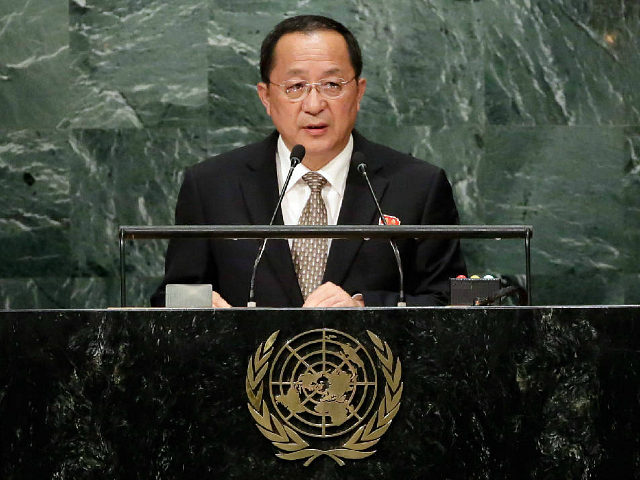The communist government of North Korea has dispatched Foreign Minister Ri Yong-ho to Cuba for an “official visit,” state media confirmed on Friday, as Pyongyang prepares to receive an envoy from another communist country, China.
The South Korean newswire service Yonhap reported on Friday that Ri and a North Korean delegation flew out of Pyongyang towards Havana on Friday, citing the Korean Central News Agency (KCNA). KCNA, the state news service of North Korea, announced that a “delegation led by Foreign Minister Ri Yong-ho left here Friday to pay an official visit to Cuba.”
KCNA did not provide any details regarding what that delegation would be discussing with communist authorities in Cuba or why the trip was scheduled for this week. It also remains unclear how long the delegation would be there. Depending on how long they stay, one potential explanation for the visit would be the one-year anniversary of the death of mass murder Fidel Castro on November 25.
Yonhap notes that North Korea is facing deliberations at the United Nations over further international sanctions on its regime over its increasingly belligerent nuclear weapons program. Among those with high standing at the U.N. Security Council are officials in China, who also announced this week that they would send representatives to North Korea.
Special Envoy Song Tao is scheduled to arrive in North Korea on Friday. The Chinese Foreign Ministry explained that his visit would be a routine one that China executes following every Communist Party Congress to other nations.
“It is a long-standing tradition to inform each other on Party Congress between the Communist Party of China and Communist Party of other socialist countries,” spokesman Geng Shuang explained on Thursday. “Therefore, the arrangements regarding sending special envoy[s] to brief Vietnam, Laos and the DPRK were made upon mutual consultation.”
He referred to North Korea as a “close neighbor,” with which China wants to keep “friendly and cooperative relations.”
He added that the Chinese envoy will discuss “issues of common concern” with North Korea, without elaborating.
China is also engaging in relations with Cuba. The People’s Daily published an interview showcasing Cuba’s Foreign Vice-Minister Marcelino Medina this week, which the Foreign Ministry highlighted on its website. “In the exchange, the Vice-Minister highlighted the development of bilateral relations in recent years where Cuba has become China’s largest trade partner in the Caribbean and China the second-largest trade partner of Cuba.”
Medina also expressed support for China’s “One Belt One Road” initiative, a sprawling infrastructure plan designed for China to monopolize global trade.
Cuba is one of North Korea’s most loyal allies on the world stage. In August, the North Korean state newspaper Rodong Sinmun complimented the bilateral relationship as an “invincible friendship forged under the banner of socialism.” Granma, Rodong Sinmun‘s Cuban analog, praised North Korea that month for insisting on continuing its illegal nuclear weapons development—or, as they phrased it, “resisting without fear before Washington’s repeated military threats.”
North Korea and Cuba have signed multiple intelligence-sharing agreements and many have suspected that Cuba engaged in prohibited trade with the country. In 2014, Panamanian authorities intercepted a North Korean ship attempting to cross the Panama Canal carrying undeclared Cuban weapons, hidden under large bags of sugar. North Korea paid a $700,000 fine and the ship’s three top crew members were arrested.

COMMENTS
Please let us know if you're having issues with commenting.